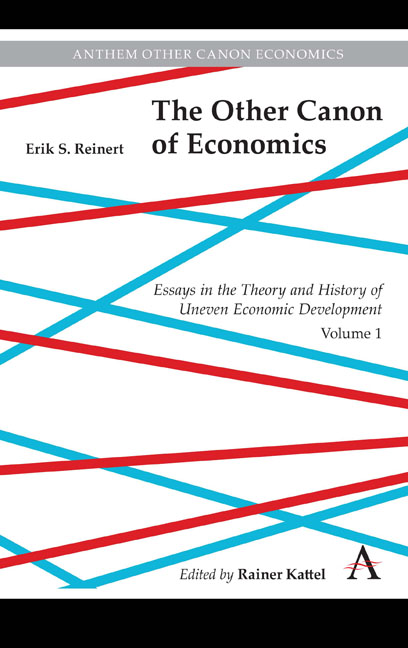Book contents
- Frontmatter
- Dedication
- Contents
- Introduction
- Chapter 1 Catching-up from Way Behind. A Third World Perspective on First World History
- Chapter 2 Recent Trends in Economic Theory — Implications for Development Geography
- Chapter 3 A Schumpeterian Theory of Underdevelopment - A Contradiction in Terms?
- Chapter 4 Competitiveness and Its Predecessors - A 500-Year Cross-national Perspective
- Chapter 5 Diminishing Returns and Economic Sustainability: The Dilemma of Resource-based Economies under a Free Trade Regime
- Chapter 6 Economics: ‘The Dismal Science’ or ‘The Never-ending Frontier of Knowledge’? On Technology, Energy and Economic Welfare
- Chapter 7 Production Capitalism vs. Financial Capitalism – Symbiosis and Parasitism. An Evolutionary Perspective and Bibliography
- Chapter 8 Globalization in the Periphery as a Morgenthau Plan: The Underdevelopment of Mongolia in the 1990s
- Chapter 9 Increasing Poverty in a Globalized World: Marshall Plans and Morgenthau Plans as Mechanisms of Polarization of World Incomes
- Chapter 10 An Early National Innovation System: The Case of Antonio Serra’s 1613 Breve Trattato
- Chapter 11 Innovation Systems of the Past: Modern Nation-States in a Historical Perspective. The Role of Innovations and of Systemic Effects in Economic Thought and Policy
- Chapter 12 The Other Canon: The History of Renaissance Economics
- Chapter 13 Benchmarking Success: The Dutch Republic (1500–1750) as Seen by Contemporary European Economists
- Chapter 14 Mercantilism and Economic Development: Schumpeterian Dynamics, Institution Building and International Benchmarking
- Chapter 15 Development and Social Goals: Balancing Aid and Development to Prevent ‘Welfare Colonialism’
Chapter 10 - An Early National Innovation System: The Case of Antonio Serra’s 1613 Breve Trattato
Published online by Cambridge University Press: 13 April 2024
- Frontmatter
- Dedication
- Contents
- Introduction
- Chapter 1 Catching-up from Way Behind. A Third World Perspective on First World History
- Chapter 2 Recent Trends in Economic Theory — Implications for Development Geography
- Chapter 3 A Schumpeterian Theory of Underdevelopment - A Contradiction in Terms?
- Chapter 4 Competitiveness and Its Predecessors - A 500-Year Cross-national Perspective
- Chapter 5 Diminishing Returns and Economic Sustainability: The Dilemma of Resource-based Economies under a Free Trade Regime
- Chapter 6 Economics: ‘The Dismal Science’ or ‘The Never-ending Frontier of Knowledge’? On Technology, Energy and Economic Welfare
- Chapter 7 Production Capitalism vs. Financial Capitalism – Symbiosis and Parasitism. An Evolutionary Perspective and Bibliography
- Chapter 8 Globalization in the Periphery as a Morgenthau Plan: The Underdevelopment of Mongolia in the 1990s
- Chapter 9 Increasing Poverty in a Globalized World: Marshall Plans and Morgenthau Plans as Mechanisms of Polarization of World Incomes
- Chapter 10 An Early National Innovation System: The Case of Antonio Serra’s 1613 Breve Trattato
- Chapter 11 Innovation Systems of the Past: Modern Nation-States in a Historical Perspective. The Role of Innovations and of Systemic Effects in Economic Thought and Policy
- Chapter 12 The Other Canon: The History of Renaissance Economics
- Chapter 13 Benchmarking Success: The Dutch Republic (1500–1750) as Seen by Contemporary European Economists
- Chapter 14 Mercantilism and Economic Development: Schumpeterian Dynamics, Institution Building and International Benchmarking
- Chapter 15 Development and Social Goals: Balancing Aid and Development to Prevent ‘Welfare Colonialism’
Summary
Based on the economics of Joseph Schumpeter, National Innovation Systems have since the early 1990s emerged as a holistic and socioculturally embedded alternative approach to explaining economic growth. The idea that systemic relationships exist between different sectors of the economy that influence the production and implemen-tation of new knowledge, and thus economic development is, however, much older than current research indicates. We will argue the Neapolitan mercantilist Antonio Serra coherently presented the kernel of a national innovation system already in his 1613 Breve trattato, including two of its key elements: increasing returns and synergies. The problems of establishing the institutions conducive to economic growth faced by mercantilists at the end of the Renaissance are shared today by policy-makers in the developing world, and it can therefore prove to be fruitful, if not necessary, to explore the historical roots of this early innovation system approach. Indeed, Serra's work has been brought back to light on several occasions in the past centuries, each time as a source of guidance in an era of economic turmoil: first on the eve of Italian unification, then at the dawn of German industrialization. Following the failure of the Cancun meetings in 2003 to reach a trade agreement between North and South, such turmoil is over us again as it becomes increasingly clear that the reigning economic dogma has failed to deliver on its political promises. We argue that, in the economic profession's inevitable search for new means and methods, Serra's message is again relevant.
Introduction—Mercantilism as a National System of Innovation
It has frequently been noted that static, barter-centered mainstream economics, as a collection of theoretical variants orbiting the neoclassical paradigm, is presently under siege by a wider, more dynamic and socially embedded alternative that focuses on production and innovation as mechanisms of economic growth (Broda 1996: 235; Magnusson and Ottosson 1997: 1–9; North 2001: 491). As a subset of the neo-Schumpeterian alter-native, the innovation system approach—broadly conceived as the existence of institutional synergies fuelling innovative activity and economic growth—has become widely diffused in the past few years, recently, with the Globelics network meeting in Rio de Janeiro late 2003, also entering seriously into the discourse on Third World development.
- Type
- Chapter
- Information
- The Other Canon of EconomicsEssays in the Theory and History of Uneven Economic Development, pp. 283 - 306Publisher: Anthem PressPrint publication year: 2024

